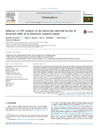Identificador persistente para citar o vincular este elemento:
https://accedacris.ulpgc.es/jspui/handle/10553/75416
| Campo DC | Valor | idioma |
|---|---|---|
| dc.contributor.author | Almeda, Rodrigo | en_US |
| dc.contributor.author | Harvey T. E | en_US |
| dc.contributor.author | Connelly T.L | en_US |
| dc.contributor.author | Baca, S | en_US |
| dc.contributor.author | Buskey E | en_US |
| dc.date.accessioned | 2020-11-11T14:03:57Z | - |
| dc.date.available | 2020-11-11T14:03:57Z | - |
| dc.date.issued | 2016 | en_US |
| dc.identifier.issn | 0045-6535 | en_US |
| dc.identifier.uri | https://accedacris.ulpgc.es/handle/10553/75416 | - |
| dc.description.abstract | Toxic effects of petroleum to marine zooplankton have been generally investigated using dissolved petroleum hydrocarbons and in the absence of sunlight. In this study, we determined the influence of natural ultraviolet B (UVB) radiation on the lethal and sublethal toxicity of dispersed crude oil to naupliar stages of the planktonic copepods Acartia tonsa, Temora turbinata and Pseudodiaptomus pelagicus. Low concentrations of dispersed crude oil (1 μL L−1) caused a significant reduction in survival, growth and swimming activity of copepod nauplii after 48 h of exposure. UVB radiation increased toxicity of dispersed crude oil by 1.3–3.8 times, depending on the experiment and measured variables. Ingestion of crude oil droplets may increase photoenhanced toxicity of crude oil to copepod nauplii by enhancing photosensitization. Photoenhanced sublethal toxicity was significantly higher when T. turbinata nauplii were exposed to dispersant-treated oil than crude oil alone, suggesting that chemical dispersion of crude oil may promote photoenhanced toxicity to marine zooplankton. Our results demonstrate that acute exposure to concentrations of dispersed crude oil and dispersant (Corexit 9500) commonly found in the sea after oil spills are highly toxic to copepod nauplii and that natural levels of UVB radiation substantially increase the toxicity of crude oil to these planktonic organisms. Overall, this study emphasizes the importance of considering sunlight in petroleum toxicological studies and models to better estimate the impact of crude oil spills on marine zooplankton. | en_US |
| dc.language | eng | en_US |
| dc.relation.ispartof | Chemosphere | en_US |
| dc.source | Chemosphere [ISSN 0045-6535], v. 152, p. 446-458 (June 2016) | en_US |
| dc.subject | 251001 Oceanografía biológica | en_US |
| dc.subject.other | Crude oil | en_US |
| dc.subject.other | Copepod nauplii | en_US |
| dc.subject.other | UVB radiation | en_US |
| dc.subject.other | Dispersant | en_US |
| dc.title | Influence of UVB radiation on the lethal and sublethal toxicity of dispersed crude oil to planktonic copepod nauplii. | en_US |
| dc.identifier.doi | 10.1016/j.chemosphere.2016.02.129 | en_US |
| dc.description.lastpage | 458 | en_US |
| dc.description.firstpage | 446 | en_US |
| dc.relation.volume | 152 | en_US |
| dc.investigacion | Ciencias | en_US |
| dc.type2 | Artículo | en_US |
| dc.description.numberofpages | 13 | en_US |
| dc.utils.revision | Sí | en_US |
| dc.identifier.ulpgc | No | en_US |
| dc.contributor.buulpgc | BU-BAS | en_US |
| dc.description.sjr | 1,417 | |
| dc.description.jcr | 4,208 | |
| dc.description.sjrq | Q1 | |
| dc.description.jcrq | Q1 | |
| dc.description.scie | SCIE | |
| item.grantfulltext | open | - |
| item.fulltext | Con texto completo | - |
| crisitem.author.dept | GIR ECOAQUA: Ecofisiología de Organismos Marinos | - |
| crisitem.author.dept | IU de Investigación en Acuicultura Sostenible y Ecosistemas Marinos (IU-Ecoaqua) | - |
| crisitem.author.dept | Departamento de Biología | - |
| crisitem.author.orcid | 0000-0002-0090-112X | - |
| crisitem.author.parentorg | IU de Investigación en Acuicultura Sostenible y Ecosistemas Marinos (IU-Ecoaqua) | - |
| crisitem.author.fullName | Almeda García, Rodrigo | - |
| Colección: | Artículos | |
Citas de WEB OF SCIENCETM
Citations
24
actualizado el 15-feb-2026
Visitas
246
actualizado el 15-ene-2026
Descargas
139
actualizado el 15-ene-2026
Google ScholarTM
Verifica
Altmetric
Comparte
Exporta metadatos
Los elementos en ULPGC accedaCRIS están protegidos por derechos de autor con todos los derechos reservados, a menos que se indique lo contrario.
